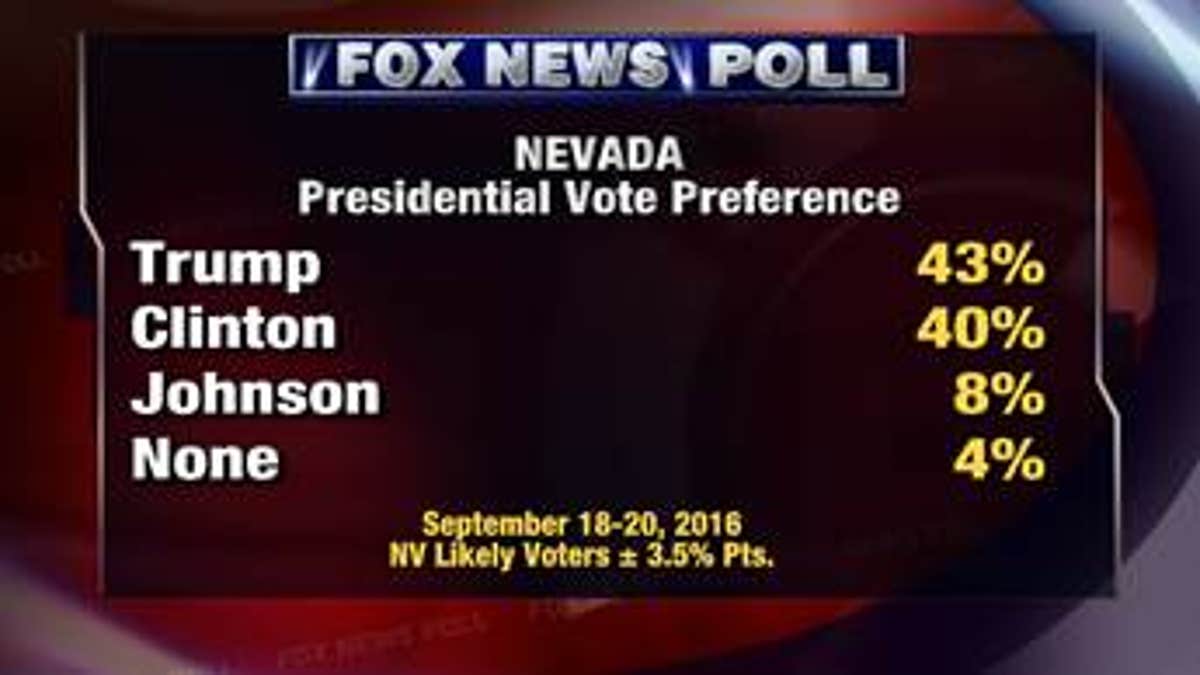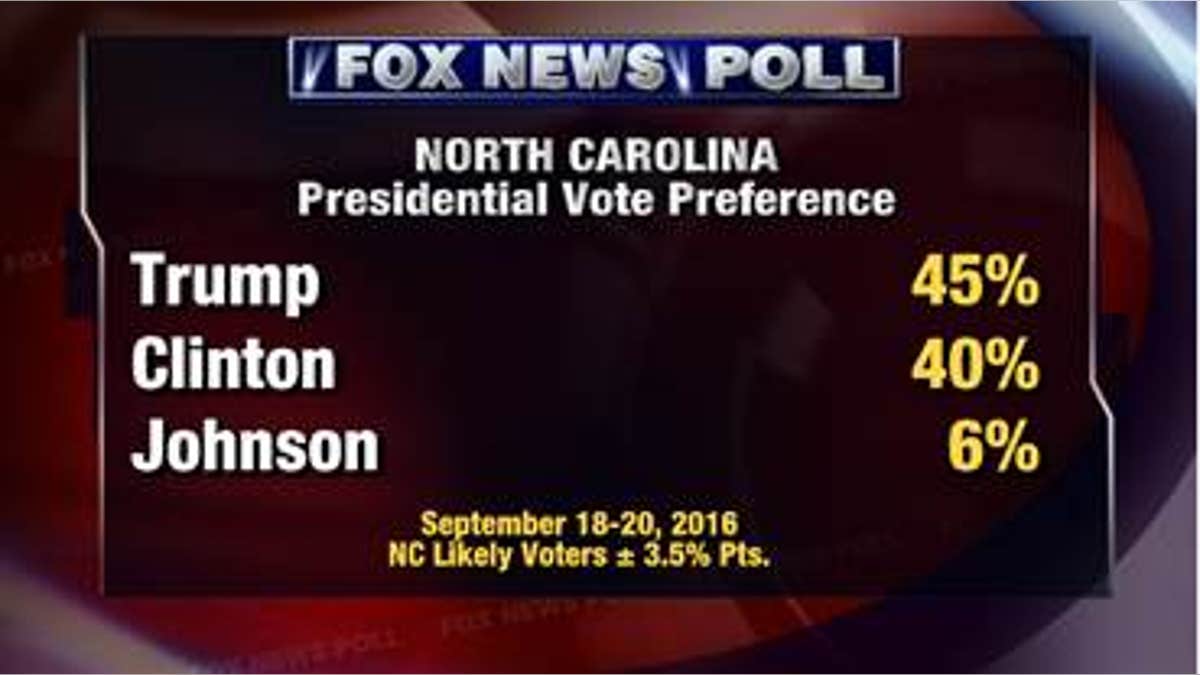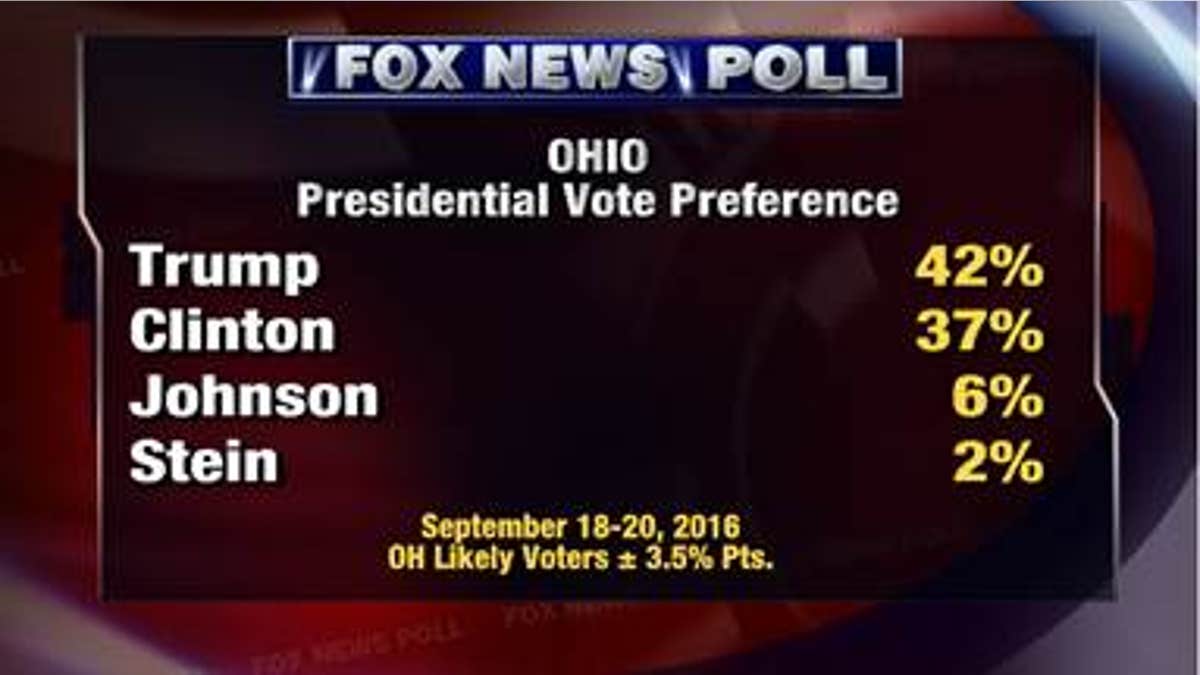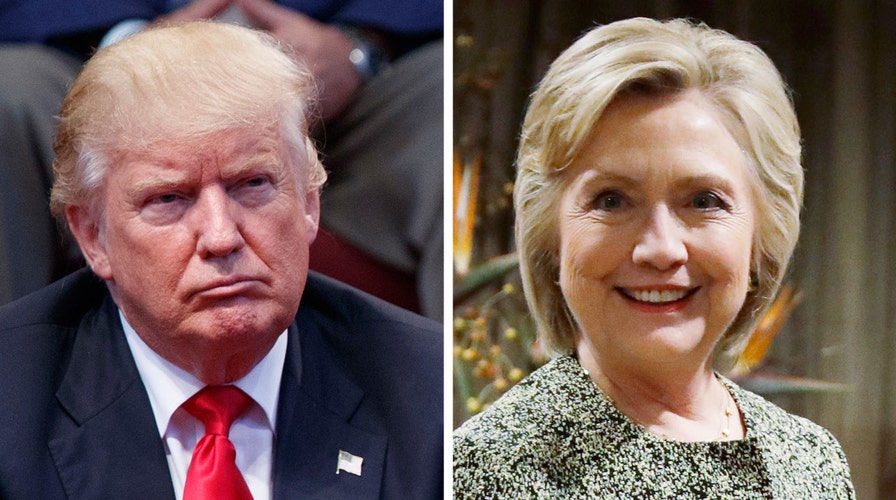Donald Trump narrowly leads Hillary Clinton in the battleground states of Nevada, North Carolina, and Ohio.
That’s according to Fox News statewide likely voter polls conducted Sunday through Tuesday evenings.
Trump is helped by strong support from working-class white voters, while Clinton is hurt by a lackluster performance among younger voters and women.
In each state, Trump’s advantage is within the margin of sampling error. Here’s how the numbers breakdown state-by-state:
Nevada
Trump has a three-point advantage over Clinton among likely voters in the Silver State (43-40 percent). Libertarian Gary Johnson receives eight percent. Nevada voters also can cast a ballot for “none of these,” and that option takes four percent. Green Party candidate Jill Stein is not on the ballot in Nevada.

Independents back Trump (42 percent) over Clinton (23 percent) and Johnson (21 percent).
The Democrat is trailing expectations among women and younger voters.
CLICK HERE TO READ THE NEVADA POLL RESULTS
Those under age 45 are almost equally likely to back Clinton (42 percent) as they are to back Trump (39 percent) -- and Johnson garners double-digit support (11 percent).
Women in Nevada backed Barack Obama over Mitt Romney by a 16-point margin in 2012, according to the Fox News Exit Poll. Clinton’s up by just six points.
Both Clinton and Trump supporters have a high degree of vote certainty (93 percent each).
“There is a huge geographic disparity in Nevada,” notes Democratic pollster Chris Anderson, who conducts the Fox News Poll with Republican Daron Shaw. “Clinton is ahead in Vegas and urban areas, while Trump leads outside Vegas and in rural areas -- this is an obvious advantage for Clinton in get-out-the-vote efforts.”
The race is mostly unchanged in a head-to-head matchup without Johnson: Trump 46 vs. Clinton 42 percent.
Views of President Obama’s job performance are divided: 49 percent approve, while 48 percent disapprove. He won Nevada in both 2012 (by 6.7 points) and 2008 (by 12.5 points).
North Carolina
In North Carolina, Trump is up by five points among likely voters. He receives 45 percent to Clinton’s 40 percent, and 6 percent favor Johnson. Stein is not on the ballot.
Whites back Trump by a 31-point margin (58-27 percent), while blacks support Clinton by 82 points (85-3 percent).

Independents favor Trump (41 percent) over Clinton (24 percent) and Johnson (14 percent).
And while voters under age 45 prefer Clinton by 46-32, Johnson gets 11 percent of them.
CLICK HERE TO READ THE NORTH CAROLINA POLL RESULTS
Ninety-five percent of Trump supporters and 90 percent of Clinton backers feel certain of their vote choice.
In the two-way ballot, Trump’s also up five (47-42 percent).
North Carolina was red in 2012 (Romney by two points) and blue in 2008 (Obama by less than one point). By a 50-46 percent margin, more voters disapprove than approve of Obama today.
Ohio
The Buckeye State is another must-win for Trump, and the poll finds him up by five points among likely voters: 42-37 percent. Johnson receives six percent and Stein gets two percent.
Trump’s edge over Clinton comes mainly from independents (+20 points) and working-class whites (+26). Clinton’s up by just three points among women. Obama won them by 11 in 2012.

Most of Clinton’s (89 percent) and Trump’s supporters (88 percent) are certain they will back their candidate.
“Clinton’s mistakes on the campaign trail have driven many disaffected Republicans into Trump’s camp,” says Shaw. “Just as consequential is the fact Trump is ahead of Clinton among independents by 17-20 points in these states. If that holds, he might actually pull this off.”
Meanwhile, by a 58-30 percent margin, voters approve of the job Republican John Kasich is doing as governor. Among those who approve, 45 percent support Trump, 33 percent back Clinton, and 7 percent Johnson.
CLICK HERE TO READ THE OHIO POLL RESULTS
Without third-party candidates in the mix, it’s Trump over Clinton by 45-40 percent.
Currently, 47 percent of voters approve of the job Obama is doing, while 48 percent disapprove. He won Ohio in both 2012 (by three points) and 2008 (by almost five points).
“Trump has been much more disciplined in his comments recently and is almost certainly benefiting from keeping his attacks focused on Clinton as opposed to other Republicans or Gold Star families,” says Anderson.
Meanwhile, Clinton trails Trump by two points among voters living in union households. That voting bloc went for Obama over Romney by 23 points in 2012.
Senate Races
The polls, released Wednesday, also ask about the senate races in these key states, and find the races within the margin of error in Nevada and North Carolina, while Republican Rob Portman holds a double-digit lead in Ohio. In each state, the GOP senate candidate fares slightly better than Trump.
There’s good news for Republicans in Nevada, where they hope to pick up the seat of the retiring Democratic Senate Leader Harry Reid. Joe Heck leads his Democratic opponent Catherine Cortez Masto by seven points: 43-36 percent. Independent American Party candidate Tom Jones trails with 6 percent and “none of these” gets 5 percent.
In North Carolina, incumbent Sen. Richard Burr bests Democratic challenger Deborah Ross by 43-37 percent, with Libertarian Sean Haugh at 6 percent.
Ohio Sen. Rob Portman holds a 14-point lead over Democrat Ted Strickland: 51-37 percent. The incumbent senator tops the former governor by 28 points among independents. Portman also garners the support of most Republicans (88 percent), as well as 15 percent of Democrats. He won the seat in 2010 with 57 percent of the vote.
“Winning the four-to-five seats needed to regain control of the senate becomes a tricky proposition for the Democrats if the GOP gains the Reid seat and Burr holds on,” notes Shaw. “The Democrats have to win their tight races in Pennsylvania and Indiana, and even that might not be enough.”
There’s also a gubernatorial race in North Carolina. Republican incumbent Pat McCrory tops Democrat Roy Cooper by 46-43 percent. Libertarian Lon Cecil receives 3 percent.
The Fox News Poll is conducted under the joint direction of Anderson Robbins Research (D) and Shaw & Company Research (R). The polls were conducted September 18-20, 2016, by telephone (landline and cellphone) with live interviewers among a sample of likely voters selected from statewide voter files in Nevada (704), North Carolina (734), and Ohio (737). Bilingual interviewers were used in Nevada. In all three states the margin of sampling error is plus or minus 3.5 percentage points for the total sample of likely voters.





